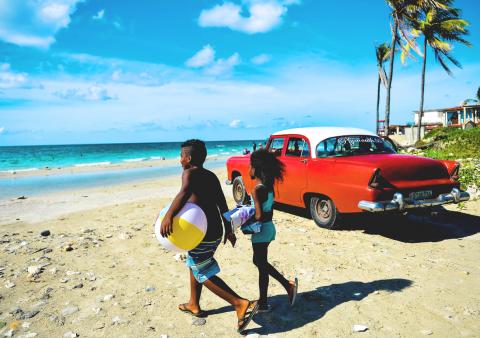Cuba’s constitution guarantees its people access to its beaches, but many locals are unable to enjoy the island’s pristine white sands and crystal clear blue waters.
While foreign tourists flock to such paradisiacal Havana sites as Varadero, which was this year named the second-most beautiful beach in the world by American travel web site TripAdvisor, Cubans are typically found elsewhere.
“Not many tourists come here,” said Rey Gonzalez, 43, who was enjoying a day at Guanabo, a beach east of the capital.

Photo: AFP
Guanabo’s sand is not as white and the water not quite as clear as Varadero’s, but that mattered little to Gonzalez, who was there with his family.
“For me, all the beaches are the same: sand, the sea ... you don’t see the difference when you’re swimming,” Gonzalez said.
Sitting on a stretch of beach where numerous stray beer cans were visible, Lazaro Palomino, 34, added: “We like the beach, whether it’s clean or dirty.”
Even so, Palomino recognizes that Varadero is on a different level.
“All Cubans would love to go. I went once and I came back in shock” at its beauty, Palomino said with a chuckle.
Like everything else in communist Cuba, beaches are a political issue.
“In Cuba, there are only Cuban beaches, which are part of the nation’s heritage,” said Jose Luis Perello, a tourism expert.
He quotes article 23 of the constitution, which asserts that the country’s 271 beaches are “socialist property belonging to everyone.”
It has been that way since the communist revolution led by Fidel Castro in 1959.
Before that, the coast was covered by private beaches reserved for members — who were mostly white.
Even former dictator Fulgencio Batista, who reigned twice, first from 1940 to 1944 and then from 1955 to 1959, was unable to obtain a membership card because he was mixed race.
However, while the revolution established universal beach access, the shoreline remains a place viewed with suspicion.
“It was linked to the illegal exodus” of people trying to flee the island’s communist rulers “and was the entry point to the country of little groups with certain interests,” Perello said, alluding to the failed US-backed Bay of Pigs invasion in 1961.
Despite the official party line, dissidents such as late writer Reinaldo Arenas complained that they could not go to certain beaches that were reserved for members of trade unions.
Likewise, for many years, Cubans were banned from hotels, and today they are still not allowed to board boats.
Another reason Cubans are kept off their island’s beaches is tourism. Last year’s 4.75 million visitors brought in US$3.3 billion — money the Cuban government sorely needs as it struggles under crippling US sanctions.
At least one hotel in Varadero advertises an exclusive beach, and locals say security guards kick them off hotel beaches.
For locals, just getting to the beach can also be a challenge.
Most do not own a car and cannot afford the bus fare to take them to the shore.
Caridad Vidangel, 48, managed to reach Bacuranao, but only after taking a bus and then a horse-drawn carriage.
“If we could, we’d go somewhere else,” she said of the beach, the closest one to her home. “I’ve never been to Varadero. I’d like to ... but it’s impossible.”

Four people jailed in the landmark Hong Kong national security trial of "47 democrats" accused of conspiracy to commit subversion were freed today after more than four years behind bars, the second group to be released in a month. Among those freed was long-time political and LGBTQ activist Jimmy Sham (岑子杰), who also led one of Hong Kong’s largest pro-democracy groups, the Civil Human Rights Front, which disbanded in 2021. "Let me spend some time with my family," Sham said after arriving at his home in the Kowloon district of Jordan. "I don’t know how to plan ahead because, to me, it feels

Polish presidential candidates offered different visions of Poland and its relations with Ukraine in a televised debate ahead of next week’s run-off, which remains on a knife-edge. During a head-to-head debate lasting two hours, centrist Warsaw Mayor Rafal Trzaskowski, from Polish Prime Minister Donald Tusk’s governing pro-European coalition, faced the Eurosceptic historian Karol Nawrocki, backed by the right-wing populist Law and Justice party (PiS). The two candidates, who qualified for the second round after coming in the top two places in the first vote on Sunday last week, clashed over Poland’s relations with Ukraine, EU policy and the track records of their

‘A THREAT’: Guyanese President Irfan Ali called on Venezuela to follow international court rulings over the region, whose border Guyana says was ratified back in 1899 Misael Zapara said he would vote in Venezuela’s first elections yesterday for the territory of Essequibo, despite living more than 100km away from the oil-rich Guyana-administered region. Both countries lay claim to Essequibo, which makes up two-thirds of Guyana’s territory and is home to 125,000 of its 800,000 citizens. Guyana has administered the region for decades. The centuries-old dispute has intensified since ExxonMobil discovered massive offshore oil deposits a decade ago, giving Guyana the largest crude oil reserves per capita in the world. Venezuela would elect a governor, eight National Assembly deputies and regional councilors in a newly created constituency for the 160,000

North Korea has detained another official over last week’s failed launch of a warship, which damaged the naval destroyer, state media reported yesterday. Pyongyang announced “a serious accident” at Wednesday last week’s launch ceremony, which crushed sections of the bottom of the new destroyer. North Korean leader Kim Jong-un called the mishap a “criminal act caused by absolute carelessness.” Ri Hyong-son, vice department director of the Munitions Industry Department of the Party Central Committee, was summoned and detained on Sunday, the Korean Central News Agency (KCNA) reported. He was “greatly responsible for the occurrence of the serious accident,” it said. Ri is the fourth person